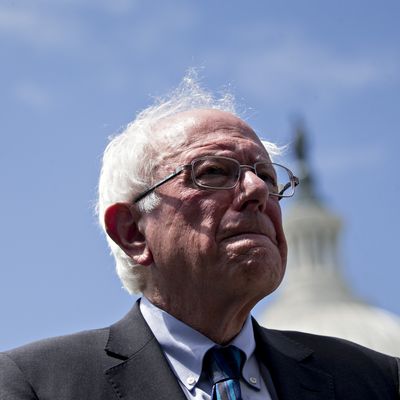
Let me put my “to be sure” qualifying hedge right up top: Bernie Sanders retains enormous assets in his 2020 presidential bid, including very high name ID, high favorability ratios among Democrats, a solidly established connection with several popular policy ideas, an estimable grassroots fund-raising machine, a nationwide network of volunteers, and priceless presidential-campaign experience. We’re only in July of the year before the year when the nominating context gets real with actual voting. It would be ridiculous to write him off.
Now that I’ve said all that, the early summer of 2019 isn’t going well for the 2016 runner-up. His troubles are best illustrated by two recent news stories. One involves this weekend’s Netroots Nation activist conclave, which should by rights have been Sanders Country. It was anything but, as Elizabeth Warren ate his lunch:
If there were a summer camp for the “vast left-wing conspiracy,” as Trump White House adviser Kellyanne Conway has dubbed it, it’d be the annual Netroots Nation Conference here this weekend.
And among those campers — the 3,700 liberal activists and operatives — two candidates in the upcoming Democratic presidential primary are clear favorites: Sens. Elizabeth Warren, D-Mass., and Bernie Sanders, I-Vt.
But only one of the two showed up to address the faithful. Warren received a rockstar welcome at a candidate forum Saturday, while Sanders skipped the conference and sent his campaign co-chair instead.
Sanders cited a scheduling conflict, but some observers suspected the decision to skip Netroots Nation might have been driven by bad memories from the same event in 2015 — in which he was challenged by Black Lives Matters activists and looked really annoyed — or a running feud he and his campaign have had with Daily Kos founder Markos Moulitas, who moderated this year’s presidential-candidate forum. Markos scorned Sanders for his absence:
According to at least one reporter, The Atlantic’s Elaine Godfrey, it wasn’t just Bernie’s absence that was a problem for him at the Philadelphia event. Another absent candidate, Kamala Harris, seemed to be eclipsing him among many progressive activists, probably owing to her debate challenge to Joe Biden:
[M]any attendees already seem fairly certain about their choice: They want Elizabeth Warren, the progressive senator from Massachusetts, to be their next president. And if they have to pick a second choice? It’s Senator Kamala Harris of California.
A second news story today was more terrifying for Team Sanders, albeit from a less than entirely convincing source: A new survey of likely voters in the New Hampshire Democratic primary from St. Anselm College showed Bernie in fifth place, as WMUR reports:
Harris, apparently still resonating with voters following her debate performance more than two weeks ago, is backed by 17.5 percent of likely Democratic first-in-the-nation primary voters. That support puts her just more than 3 percentage points behind former Vice President Joe Biden, who received 20.8 percent.
Sen. Elizabeth Warren is a close third, at 16.7 percent, less than a percentage point behind Harris. Sanders registered 9.9 percent, behind Mayor Pete Buttigieg, who is fourth in the poll with 11.5 percent.
As a reminder, Sanders won the 2016 New Hampshire primary over Hillary Clinton with 60 percent of the vote. Yes, the field is much larger, but that’s still quite a fall from grace in the Granite State, and there’s no way to sugar-coat a fifth-place showing other than to note that the poll is taken from a small sample and has a margin of error of over 5 percent.
Perhaps such reports are off-center or premature. But there’s not much question that Sanders has hit a rough patch, particularly since the June 26–27 candidate debates in Miami, in which Warren excelled on the first night and Harris on the second. In the RealClearPolitics averages of national polls, Sanders has been replaced as the second-ranking candidate behind Biden (who is having troubles of his own) and is basically tied with Harris. Last week, FiveThirtyEight’s Nate Silver (who, it should be noted, is in regular Twitter controversy with Bernie’s people) dropped Sanders into his second tier of candidates, with Biden, Warren, and Harris in the first tier. And Silver’s colleague Nathaniel Rakich observed that Sanders has less strategic flexibility than his rivals:
Another potential pitfall for Sanders is that he has so far limited himself with a campaign strategy that doesn’t appear designed to expand beyond his base. But to win the nomination, he’ll need to win over some new fans — especially if he keeps losing old ones. Ardent progressives have more options (most obviously Warren) to choose from than they did in 2016, and Sanders may have underestimated how much of his 2016 support was simply a protest vote against Hillary Clinton. An Emerson College poll out this week found he was getting only 25 percent of the vote among those who said they supported him in 2016.
Sanders’s original strategy was probably to ride his 2016 base and his money machine to first or second place and then go mano a mano against fellow septuagenarian Joe Biden over issues of ideology and electability. But the landscape has grown more complicated, and the question is whether Bernie can find a campaign tone more subtle than shouting, and a path to the nomination more nuanced than a direct assault across scorched ground.






























